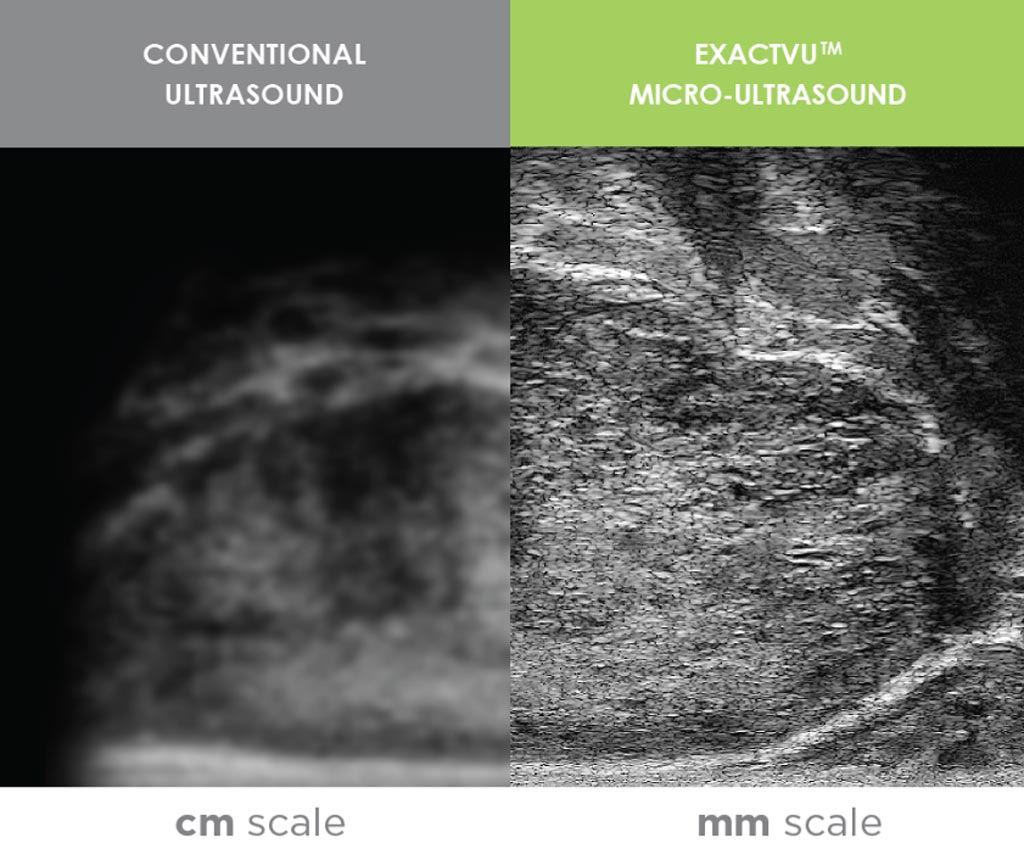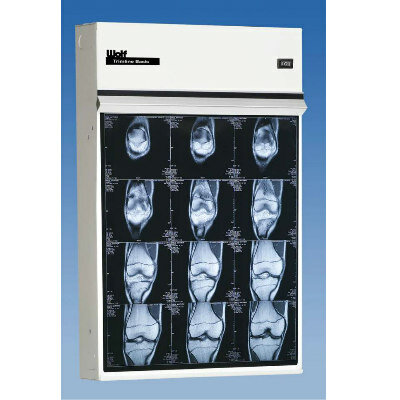AI Applied to Micro-Ultrasound Could Speed Cancer Detection
|
By MedImaging International staff writers Posted on 24 Sep 2018 |

Image: A new advanced ultrasound imaging technique is being combined with artificial intelligence to improve the detection of prostate cancer (Photo courtesy of Exact Imaging).
Cambridge Consultants (Cambridge, UK) and Exact Imaging (Markham, ON, USA) are working together to improve the way prostate cancer is visualized and detected by applying deep learning to high-resolution micro-ultrasound imaging. This can help identify potential suspicious regions of tissue and inform urologists who may want to consider this additional data in their biopsy protocol. The early results of their work have been promising.
Exact Imaging develops high-resolution micro-ultrasound systems enabling real-time imaging and guided biopsies in the urological market for prostate cancer. It is the maker of the ExactVu micro-ultrasound platform, an imaging tool which allows urologists to harness “micro”-ultrasound’s near microscopic resolution in order to visualize suspicious regions and actually target their biopsies to those regions.
Cambridge Consultants is at the forefront of advances in machine learning and deep learning, applying this transformative technology to a wide range of industries and disciplines. The current work on prostate cancer is the latest output from Cambridge Consultants’ Digital Greenhouse, a unique experimental environment where data scientists and engineers explore and develop cutting edge machine learning and deep learning techniques and which aims to ensure that deep learning is potent beyond the huge online datasets that have powered advances to date. Recent work has focused on applying deep learning in areas where massive datasets are unavailable. In the case of its work on prostate cancer, data was available for hundreds of patients.
With Cambridge Consultants’ AI tools being able to interrogate the full ultrasound data set when correlated to pathology, the analysis is expected to deliver improved accuracy and better characterization of suspicious regions. The machine learning approach being applied is faster and less computationally intensive than traditional statistical approaches and could ultimately form the backbone of a commercially viable software application. Early results from proof of concept testing show significant promise, even with relatively limited data sets.
“The need for effective management of prostate cancer is as pressing as ever,” said Shweta Gupta, Head of Urology and Women’s Health at Cambridge Consultants. “We are proud to have the opportunity to try and improve the detection pathway and excited by the opportunity to apply deep learning to this significant clinical problem.”
Related Links:
Cambridge Consultants
Exact Imaging
Exact Imaging develops high-resolution micro-ultrasound systems enabling real-time imaging and guided biopsies in the urological market for prostate cancer. It is the maker of the ExactVu micro-ultrasound platform, an imaging tool which allows urologists to harness “micro”-ultrasound’s near microscopic resolution in order to visualize suspicious regions and actually target their biopsies to those regions.
Cambridge Consultants is at the forefront of advances in machine learning and deep learning, applying this transformative technology to a wide range of industries and disciplines. The current work on prostate cancer is the latest output from Cambridge Consultants’ Digital Greenhouse, a unique experimental environment where data scientists and engineers explore and develop cutting edge machine learning and deep learning techniques and which aims to ensure that deep learning is potent beyond the huge online datasets that have powered advances to date. Recent work has focused on applying deep learning in areas where massive datasets are unavailable. In the case of its work on prostate cancer, data was available for hundreds of patients.
With Cambridge Consultants’ AI tools being able to interrogate the full ultrasound data set when correlated to pathology, the analysis is expected to deliver improved accuracy and better characterization of suspicious regions. The machine learning approach being applied is faster and less computationally intensive than traditional statistical approaches and could ultimately form the backbone of a commercially viable software application. Early results from proof of concept testing show significant promise, even with relatively limited data sets.
“The need for effective management of prostate cancer is as pressing as ever,” said Shweta Gupta, Head of Urology and Women’s Health at Cambridge Consultants. “We are proud to have the opportunity to try and improve the detection pathway and excited by the opportunity to apply deep learning to this significant clinical problem.”
Related Links:
Cambridge Consultants
Exact Imaging
Latest Industry News News
- Bayer and Google Partner on New AI Product for Radiologists
- Samsung and Bracco Enter Into New Diagnostic Ultrasound Technology Agreement
- IBA Acquires Radcal to Expand Medical Imaging Quality Assurance Offering
- International Societies Suggest Key Considerations for AI Radiology Tools
- Samsung's X-Ray Devices to Be Powered by Lunit AI Solutions for Advanced Chest Screening
- Canon Medical and Olympus Collaborate on Endoscopic Ultrasound Systems
- GE HealthCare Acquires AI Imaging Analysis Company MIM Software
- First Ever International Criteria Lays Foundation for Improved Diagnostic Imaging of Brain Tumors
- RSNA Unveils 10 Most Cited Radiology Studies of 2023
- RSNA 2023 Technical Exhibits to Offer Innovations in AI, 3D Printing and More
- AI Medical Imaging Products to Increase Five-Fold by 2035, Finds Study
- RSNA 2023 Technical Exhibits to Highlight Latest Medical Imaging Innovations
- AI-Powered Technologies to Aid Interpretation of X-Ray and MRI Images for Improved Disease Diagnosis
- Hologic and Bayer Partner to Improve Mammography Imaging
- Global Fixed and Mobile C-Arms Market Driven by Increasing Surgical Procedures
- Global Contrast Enhanced Ultrasound Market Driven by Demand for Early Detection of Chronic Diseases
Channels
Radiography
view channel
Novel Breast Imaging System Proves As Effective As Mammography
Breast cancer remains the most frequently diagnosed cancer among women. It is projected that one in eight women will be diagnosed with breast cancer during her lifetime, and one in 42 women who turn 50... Read more
AI Assistance Improves Breast-Cancer Screening by Reducing False Positives
Radiologists typically detect one case of cancer for every 200 mammograms reviewed. However, these evaluations often result in false positives, leading to unnecessary patient recalls for additional testing,... Read moreMRI
view channel
World's First Sensor Detects Errors in MRI Scans Using Laser Light and Gas
MRI scanners are daily tools for doctors and healthcare professionals, providing unparalleled 3D imaging of the brain, vital organs, and soft tissues, far surpassing other imaging technologies in quality.... Read more
Diamond Dust Could Offer New Contrast Agent Option for Future MRI Scans
Gadolinium, a heavy metal used for over three decades as a contrast agent in medical imaging, enhances the clarity of MRI scans by highlighting affected areas. Despite its utility, gadolinium not only... Read more.jpg)
Combining MRI with PSA Testing Improves Clinical Outcomes for Prostate Cancer Patients
Prostate cancer is a leading health concern globally, consistently being one of the most common types of cancer among men and a major cause of cancer-related deaths. In the United States, it is the most... Read moreUltrasound
view channel
Largest Model Trained On Echocardiography Images Assesses Heart Structure and Function
Foundation models represent an exciting frontier in generative artificial intelligence (AI), yet many lack the specialized medical data needed to make them applicable in healthcare settings.... Read more.jpg)
Groundbreaking Technology Enables Precise, Automatic Measurement of Peripheral Blood Vessels
The current standard of care of using angiographic information is often inadequate for accurately assessing vessel size in the estimated 20 million people in the U.S. who suffer from peripheral vascular disease.... Read more
Deep Learning Advances Super-Resolution Ultrasound Imaging
Ultrasound localization microscopy (ULM) is an advanced imaging technique that offers high-resolution visualization of microvascular structures. It employs microbubbles, FDA-approved contrast agents, injected... Read more
Novel Ultrasound-Launched Targeted Nanoparticle Eliminates Biofilm and Bacterial Infection
Biofilms, formed by bacteria aggregating into dense communities for protection against harsh environmental conditions, are a significant contributor to various infectious diseases. Biofilms frequently... Read moreNuclear Medicine
view channel
New Imaging Technique Monitors Inflammation Disorders without Radiation Exposure
Imaging inflammation using traditional radiological techniques presents significant challenges, including radiation exposure, poor image quality, high costs, and invasive procedures. Now, new contrast... Read more
New SPECT/CT Technique Could Change Imaging Practices and Increase Patient Access
The development of lead-212 (212Pb)-PSMA–based targeted alpha therapy (TAT) is garnering significant interest in treating patients with metastatic castration-resistant prostate cancer. The imaging of 212Pb,... Read moreNew Radiotheranostic System Detects and Treats Ovarian Cancer Noninvasively
Ovarian cancer is the most lethal gynecological cancer, with less than a 30% five-year survival rate for those diagnosed in late stages. Despite surgery and platinum-based chemotherapy being the standard... Read more
AI System Automatically and Reliably Detects Cardiac Amyloidosis Using Scintigraphy Imaging
Cardiac amyloidosis, a condition characterized by the buildup of abnormal protein deposits (amyloids) in the heart muscle, severely affects heart function and can lead to heart failure or death without... Read moreGeneral/Advanced Imaging
view channel
PET Scans Reveal Hidden Inflammation in Multiple Sclerosis Patients
A key challenge for clinicians treating patients with multiple sclerosis (MS) is that after a certain amount of time, they continue to worsen even though their MRIs show no change. A new study has now... Read more
Artificial Intelligence Evaluates Cardiovascular Risk from CT Scans
Chest computed tomography (CT) is a common diagnostic tool, with approximately 15 million scans conducted each year in the United States, though many are underutilized or not fully explored.... Read more
New AI Method Captures Uncertainty in Medical Images
In the field of biomedicine, segmentation is the process of annotating pixels from an important structure in medical images, such as organs or cells. Artificial Intelligence (AI) models are utilized to... Read more.jpg)
CT Coronary Angiography Reduces Need for Invasive Tests to Diagnose Coronary Artery Disease
Coronary artery disease (CAD), one of the leading causes of death worldwide, involves the narrowing of coronary arteries due to atherosclerosis, resulting in insufficient blood flow to the heart muscle.... Read moreImaging IT
view channel
New Google Cloud Medical Imaging Suite Makes Imaging Healthcare Data More Accessible
Medical imaging is a critical tool used to diagnose patients, and there are billions of medical images scanned globally each year. Imaging data accounts for about 90% of all healthcare data1 and, until... Read more
















